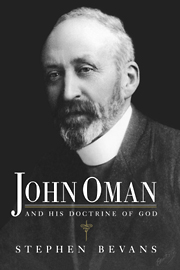Summary
John Oman's writings cover a wide range of topics, dealing explicitly with the history of modern philosophical and theological thought, the question of authority, the nature of the Church and its ministry, the doctrine of grace and the reality of religion. None of his works, however, is devoted exclusively and systematically to the doctrine of God. Nevertheless, Oman does work out of a doctrine of God which, while implicit and expressed in piecemeal fashion in his thought, becomes clear and coherent when his works are read and studied in their entirety.
What I have tried to do in this book is to construct Oman's doctrine of God out of the many expressions of this doctrine which are scattered throughout his writings. What I hope the previous pages have shown is that while Oman's doctrine of God is rather implicit and fragmentary, a reading and study of his works in their entirety can yield a consistent and powerful doctrine of God's personal and gracious relationship to humanity, one in which men and women are called to genuine autonomy and mature freedom through responsibility and commitment to God, to one another, and to their world.
In the Preface to the first edition of Grace and Personality, Oman wrote that what was important in his book was not so much his own limited application of a method, but the method itself, rooted in human experience and developed out of a conviction of the holy mystery of the human person.
- Type
- Chapter
- Information
- John Oman and his Doctrine of God , pp. 117 - 118Publisher: Cambridge University PressPrint publication year: 1992



